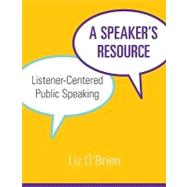
A Speaker's Resource: Listener-Centered Public Speaking
- ISBN13: 9780073534190
- ISBN10: 0073534196
- Additional ISBN(s): 9780073406749
- Edition: 1st
- Format: Spiral Bound
- Copyright: 2008-08-05
- Publisher: McGraw-Hill Humanities/Social Sciences/Languages
- View Upgraded Edition
-
Your order must be $35 or more to qualify for free economy shipping. Bulk sales, PO's, Marketplace items, eBooks and apparel do not qualify for this offer.








